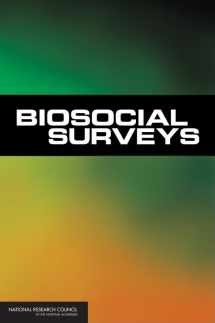
Biosocial Surveys
Book details
Summary
Description
Biosocial Surveys analyzes the latest research on the increasing number of multipurpose household surveys that collect biological data along with the more familiar interviewerâ€"respondent information. This book serves as a follow-up to the 2003 volume, Cells and Surveys: Should Biological Measures Be Included in Social Science Research? and asks these questions: What have the social sciences, especially demography, learned from those efforts and the greater interdisciplinary communication that has resulted from them? Which biological or genetic information has proven most useful to researchers? How can better models be developed to help integrate biological and social science information in ways that can broaden scientific understanding? This volume contains a collection of 17 papers by distinguished experts in demography, biology, economics, epidemiology, and survey methodology. It is an invaluable sourcebook for social and behavioral science researchers who are working with biosocial data.
Table of Contents- Front Matter
- Introduction--James W. Vaupel, Kenneth W. Wachter, and Maxine Weinstein
- Part I: What We've Learned So Far
- 1 Biological Indicators and Genetic Information in Danish Twin and Oldest-Old Surveys--Kaare Christensen, Lise Bathum, and Lene Christiansen
- 2 Whitehall II and ELSA: Integrating Epidemiological and Psychobiological Approaches to the Assessment of Biological Indicators--Michael Marmot and Andrew Steptoe
- 3 The Taiwan Biomarker Project--Ming-Cheng Chang, Dana A. Glei, Noreen Goldman, and Maxine Weinstein
- 4 Elastic Powers: The Integration of Biomarkers into the Health and Retirement Study--David Weir
- 5 An Overview of Biomarker Research from Community and Population-Based Studies on Aging--Jennifer R. Harris, Tara L. Gruenewald, and Teresa Seeman
- 6 The Women's Health Initiative: Lessons for the Population Study of Biomarkers--Robert B. Wallace
- 7 Comments on Collecting and Utilizing Biological Indicators in Social Science Surveys--Duncan Thomas and Elizabeth Frankenberg
- 8 Biomarkers in Social Science Research on Health and Aging: A Review of Theory and Practice--Douglas C. Ewbank
- Part II: The Potential and Pitfalls of Genetic Information
- 9 Are Genes Good Markers of Biological Traits?--Mary Jane West-Eberhard
- 10 Genetic Markers in Social Science Research: Opportunities and Pitfalls--George P. Vogler and Gerald E. McClearn
- 11 Comments on the Utility of Social Science Surveys for the Discovery and Validation of Genes Influencing Complex Traits--Harald H.H. Göring
- 12 Overview Thoughts on Genetics: Walking the Line Between Denial and Dreamland, or Genes Are Involved in Everything, But Not Everything Is "Genetic"--Kenneth M. Weiss
- Part III: New Ways of Collecting, Applying, and Thinking About Data
- 13 Minimally Invasive and Innovative Methods for Biomeasure Collection in Population-Based Research--Stacy Tessler Lindau and Thomas W. McDade
- 14 Nutrigenomics--John Milner, Elaine B. Trujillo, Christine M. Kaefer, and Sharon Ross
- 15 Genoeconomics--Daniel J. Benjamin, Christopher F. Chabris, Edward L. Glaeser, Vilmundur Gudnason, Tamara B. Harris, David I. Laibson, Lenore J. Launer, and Shaun Purcell
- 16 Mendelian Randomization: Genetic Variants as Instruments for Strengthening Causal Inference in Observational Studies--George Davey Smith and Shah Ebrahim
- 17 Multilevel Investigations: Conceptual Mappings and Perspectives--John T. Cacioppo, Gary G. Berntson, and Ronald A. Thisted
- 18 Genomics and Beyond: Improving Understanding and Analysis of Human (Social, Economic, and Demographic) Behavior--John Hobcraft
- Appendix: Biographical Sketches of Contributors


We would LOVE it if you could help us and other readers by reviewing the book
Book review



